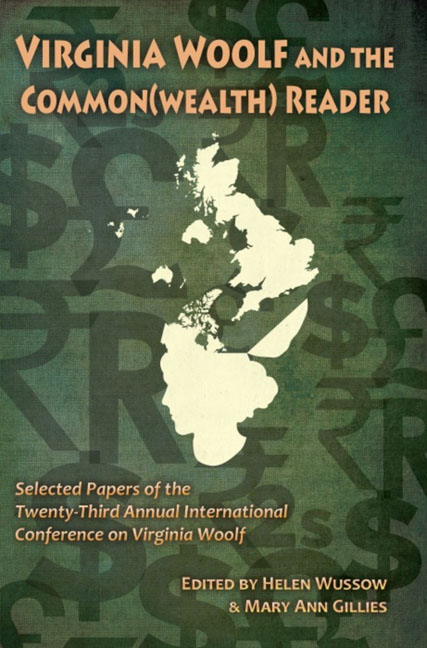Book contents
- Frontmatter
- Contents
- Introduction to Virginia Woolf and the Common(wealth) Reader
- Acknowledgments
- List of Abbreviations
- Invocations
- Networks of Affiliation: Foundations and Friends
- Woolf and the Commonwealth
- “Simplicity and art shades reign supreme”: Costume, Collectibles, and Aspiration in Katherine Mansfield's New Zealand
- Wealth in Common: Gifts, Desire, and Colonial Commodities in Woolf and Mansfield
- On a View from the Rims: Katherine Mansfield and Emily Carr
- London Calling: Una Marson in the Colonial London Scene
- Modernism Across the Commonwealth: Virginia Woolf's and Arundhati Roy's Critique of Empire
- From Bloomsbury to Fountain Lakes: An Australian Virginia Woolf
- 1930s Onwards
- Woolf Beyond the Book
- Notes on Contributors
- Conference Program
London Calling: Una Marson in the Colonial London Scene
from Woolf and the Commonwealth
- Frontmatter
- Contents
- Introduction to Virginia Woolf and the Common(wealth) Reader
- Acknowledgments
- List of Abbreviations
- Invocations
- Networks of Affiliation: Foundations and Friends
- Woolf and the Commonwealth
- “Simplicity and art shades reign supreme”: Costume, Collectibles, and Aspiration in Katherine Mansfield's New Zealand
- Wealth in Common: Gifts, Desire, and Colonial Commodities in Woolf and Mansfield
- On a View from the Rims: Katherine Mansfield and Emily Carr
- London Calling: Una Marson in the Colonial London Scene
- Modernism Across the Commonwealth: Virginia Woolf's and Arundhati Roy's Critique of Empire
- From Bloomsbury to Fountain Lakes: An Australian Virginia Woolf
- 1930s Onwards
- Woolf Beyond the Book
- Notes on Contributors
- Conference Program
Summary
In July 1932, in the midst of the serial publication of Virginia Woolf's six essays on “the London scene,” Una Marson arrived in London from Jamaica and became part of a small but signifi cant population of Afro-Caribbean students and intellectuals living in the city long before the boom of West Indian immigration after the Second World War. A writer, poet, and political activist, Marson produced her own portrait of the 1930s London scene that seems at times a world apart from that of Woolf, though the writers shared several spatial and social networks. If Marson and Woolf seem, at best, to inhabit different planes within the same space, a closer look reveals that a version of the transnational society of outsiders that Woolf would fully articulate in Three Guineas was already being imagined within Bloomsbury's colonial community. As Sara Blair has observed, the phenomenon of “Bloomsbury” has eclipsed awareness of Bloomsbury as a material location. Scholars working under “the rubric of the new cultural geography” have argued that culture and subjects “come into being not merely in a geographical or material landscape, but in a site of social activity that produces itself and its defining relations through local, personal, and public exchanges” (Blair 813). I will focus today on the possibilities for social exchange and cosmopolitan belonging as imagined by Una Marson, particularly in her most sustained treatment of the imperial metropolis, her play London Calling, produced in 1937.
Since her legacy is only in the early stages of recovery, I'll begin with a summary of Marson's life, focusing on the years leading up to and through her time in London, 1932- 36. Marson had already made a name for herself before she left Kingston for London. In 1928, at age 23, she had founded a feminist journal called The Cosmopolitan, of which she was editor and a frequent contributor. She also published two collections of poetry and, in June 1932, staged her first play, At What a Price. With the profits from that production, she sailed for London, intending, she claimed later, to stay for three months (Jarrett- Macauley 45), but where she would reside for more than four years.
- Type
- Chapter
- Information
- Virginia Woolf and the Common(wealth) Reader , pp. 107 - 114Publisher: Liverpool University PressPrint publication year: 2014



